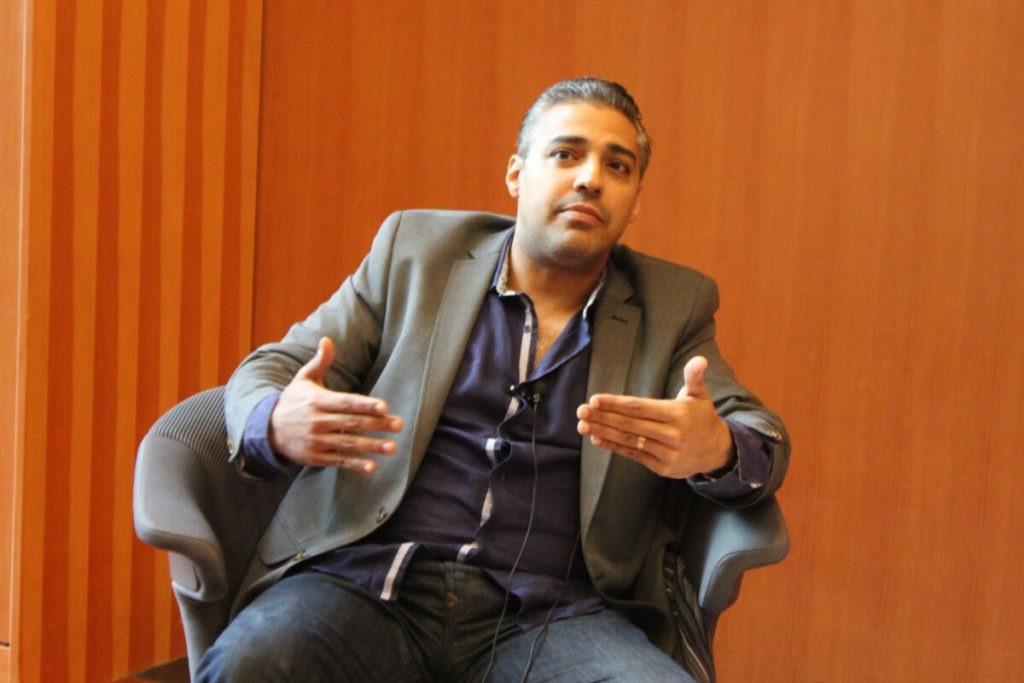
Mohamed Fahmy narrating his riveting story in the Franklin Lew Forum at the Peter A. Allard School of Law at UBC.
On November 13, 2015, Mohamed Fahmy shared details of his 2013 arrest, imprisonment and prolonged legal battle in Egypt to a packed house at the Peter A. Allard School of Law.
Fahmy, an award-winning, Egyptian-Canadian journalist and former Egypt Bureau Chief of Al Jazeera International, was sentenced for terrorism-related charges based on, as he explained, “our award winning reports.” Fahmy described how Al Jazeera’s lack of licenses to operate in Egypt complicated his legal predicament, as did the network’s recasting of several of Fahmy’s reports in its Arabic news service to favor Egypt’s Muslim Brotherhood. As his prosecution moved forward, Fahmy rejected Al Jazeera’s lawyers and established his own legal team. “From the start we had a very hard time getting a fair trial…we really never had a chance…[but] you had to believe and present a defense anyway.”

Students, faculty, and the public at the open forum with Mohamed Fahmy.
Speaking to the legal merits of the case, Fahmy explained, “this case was about sheer suppression of the press…a political case that was essentially a proxy war between Egypt and the Gulf states.” At his first trial, Fahmy received a seven-year sentence, which was reduced to three years on appeal. Following the appeal, his lawyer, Amal Clooney, assisted in procuring his eventual release by presidential pardon by lobbying the Egyptian and Canadian governments and publicly criticizing Al Jazeera’s duplicitous news reporting.
When asked about his experience in Egyptian prison, Fahmy described Egypt’s lack of adherence to international human rights obligations, sharing how for one month in solitary confinement he had little food, no access to sunlight, and no medical treatment for his broken shoulder. He shared techniques he used to maintain his mental health while in prison, which included conducting mock political interviews with notorious prisoners from their cells and reading inspirational books by Nelson Mandela and Viktor Frankl. Mandela’s books taught him about “tragic optimism” as a means of turning suffering into achievement.
Public support was crucial to Fahmy’s release. He criticized the former Harper government for not advocating directly with Egypt on his behalf, and expressed thanks to the Canadian Journalists for Freedom of Expression, the Committee to Protect Journalists, Amnesty International and the Media Legal Defence Initiative, who were “instrumental” in his release.
His experience has inspired him to found the Fahmy Foundation, which will provide financial and legal support to journalists imprisoned abroad. “I wake up every morning anticipating that my story will play out again someplace else.” He stressed that the only way for him to achieve full closure from his ordeal would be if journalists had the required security to operate on the ground. He also plans, in conjunction with Amnesty International, to submit recommendations to the Canadian government regarding better protection for Canadians imprisoned abroad.
The open forum was jointly hosted by The Peter A. Allard School of Law’s International Justice and Human Rights Clinic and the Allard Prize for International Integrity.


